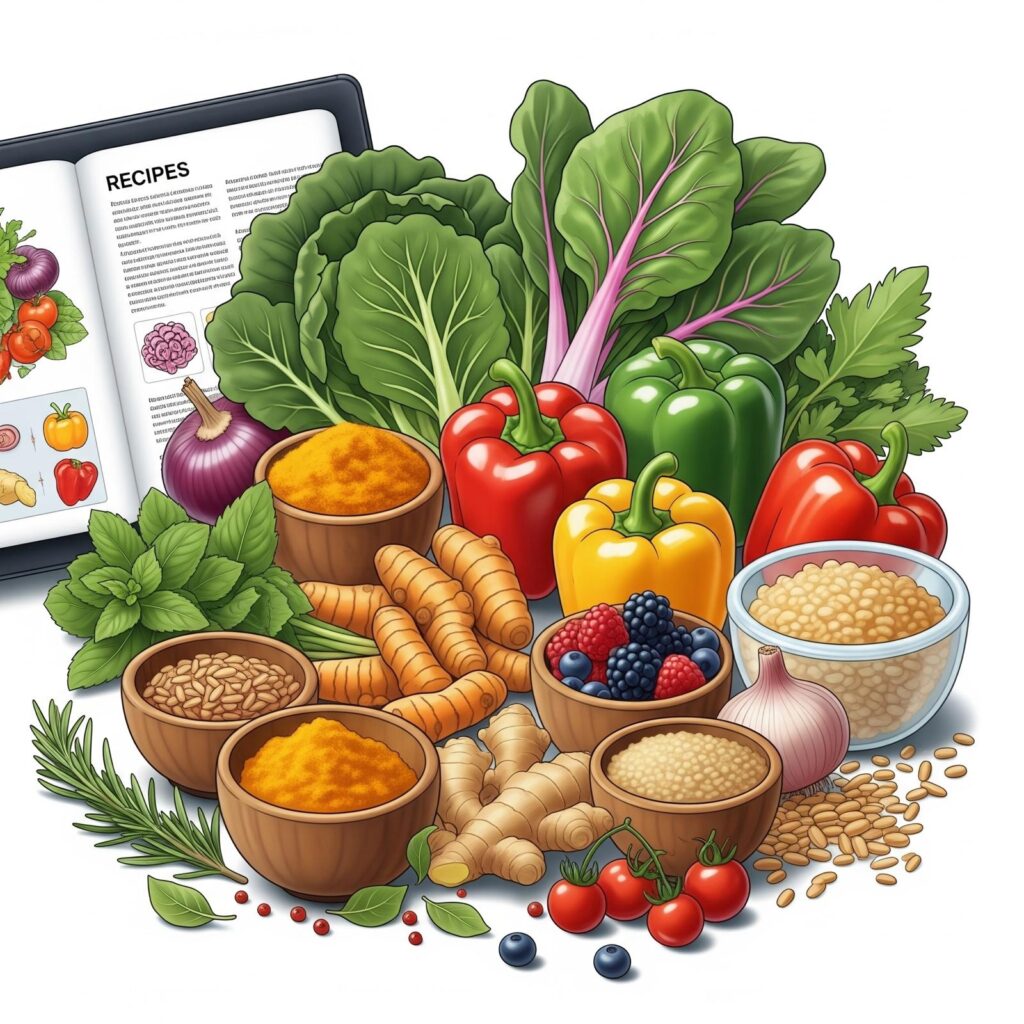Maintaining consistent focus throughout the day can be challenging, especially in a world full of digital distractions. While there is no single “magic pill” for concentration, research increasingly points to diet as an important piece of the cognitive puzzle. Certain nutrients have been linked to improved attention, memory, and overall brain health, making food choices a significant factor in boosting mental performance (Gomez-Pinilla, 2008).
Below, we examine evidence-based dietary strategies to help you stay sharp and focused, discussing key nutrients, recommended food sources, and practical tips to integrate them into your daily routine.
Keywords: Brain-friendly recipes, Focus-boosting foods, Cognitive function, Healthy fats for the brain, Omega-3 salmon recipe, Blueberry antioxidants, Green tea smoothie, Dark chocolate flavonoids, Eggs for choline
1. The Importance of Brain-Boosting Nutrients
1.1 Omega-3 Fatty Acids
Omega-3 fatty acids—particularly docosahexaenoic acid (DHA) and eicosapentaenoic acid (EPA)—are critical to brain function and structure. They play a role in maintaining cell membrane integrity, neural plasticity, and reducing inflammation in the brain (Ortega, 2019).
- Benefits: Improved attention span, better mood regulation, and enhanced cognitive processing (Swanson et al., 2012).
- Sources: Oily fish (e.g., salmon, sardines, mackerel), chia seeds, flaxseeds, and walnuts.
1.2 Antioxidants and Polyphenols
Antioxidants help protect brain cells from oxidative stress, which can impair cognitive functions over time (Joseph et al., 2009). Polyphenols—found in various fruits, vegetables, and beverages—have been associated with improved memory and learning.
- Benefits: May slow age-related cognitive decline and support sharper focus (Kesse-Guyot et al., 2012).
- Sources: Berries (e.g., blueberries, strawberries), dark chocolate (minimum 70% cocoa), green tea, and colourful vegetables like spinach and kale.
1.3 B Vitamins
B vitamins—especially vitamin B6, B9 (folate), and B12—are involved in the synthesis of neurotransmitters and myelin (Smith and Refsum, 2016). Deficiencies can lead to difficulties with concentration and memory.
- Benefits: Enhanced energy metabolism in brain cells, better mental clarity, and potentially reduced risk of cognitive decline (Smith and Refsum, 2016).
- Sources: Leafy greens, legumes, fortified cereals, eggs, dairy products, and lean meats.
1.4 Protein and Amino Acids
Proteins provide amino acids like tyrosine and tryptophan, which are precursors to key neurotransmitters (dopamine and serotonin, respectively). Adequate protein intake helps maintain stable energy levels, supporting sustained focus (Fernstrom, 2013).
- Benefits: Steadier mood, reduced mental fatigue, and improved cognitive flexibility.
- Sources: Lean meats, poultry, fish, tofu, beans, lentils, and yoghurt.
1.5 Complex Carbohydrates
While carbohydrates often get a bad rap, complex carbs supply a steady release of glucose—the brain’s primary energy source—preventing the spikes and crashes associated with simple sugars (Gibson, 2007).
- Benefits: Consistent energy, reduced mid-afternoon slump, and better concentration (Gibson, 2007).
- Sources: Whole grains (e.g., oats, brown rice, quinoa), legumes, and starchy vegetables like sweet potatoes.
2. Top Focus-Enhancing Foods
Salmon
- High in omega-3 fatty acids (EPA and DHA).
- Contains quality protein, supporting neurotransmitter production.
Blueberries
- Rich in antioxidants and anthocyanins, linked to improved memory and focus (Joseph et al., 2009).
- Easily added to breakfasts or snacks.
Avocados
- Full of monounsaturated fats, which support healthy blood flow and vascular function in the brain (Ortega, 2019).
- Versatile for salads, sandwiches, or smoothies.
Green Tea
- Contains L-theanine and caffeine, which can enhance alertness and focus without the jitteriness often caused by coffee (Bryan, 2008).
- Antioxidant properties may also protect neuronal health.
Dark Chocolate (70% cocoa or higher)
- Provides flavonoids and a mild stimulant effect through caffeine and theobromine.
- Can improve mood and attention if consumed in moderation (Scholey and Owen, 2013).
Eggs
- Packed with choline, which supports neurotransmitter (acetylcholine) production and overall cognitive function.
- Also contain vitamin B12 and folate (Smith and Refsum, 2016).
Nuts and Seeds
- Almonds, walnuts, and flaxseeds are good sources of essential fatty acids, vitamin E, and antioxidants.
- Provide protein and healthy fats to balance blood sugar levels.
Whole Grains
- Oats, quinoa, and brown rice release glucose slowly, offering sustained mental energy (Gibson, 2007).
- Contribute to stable mood and reduced cravings.
3. Timing and Balancing Meals
When and how you eat can be just as crucial as what you eat. Large, heavy meals can lead to sluggishness, while skipping meals entirely may cause low blood sugar and mental fog (Gibson, 2007).
- Regular Intervals: Aim for balanced meals or snacks every 3–4 hours to maintain stable energy levels.
- Portion Control: Avoid overeating to prevent post-meal lethargy; emphasise nutrient-dense foods.
- Stay Hydrated: Even mild dehydration can affect concentration and short-term memory (Popkin et al., 2010).
4. Lifestyle Factors That Complement Nutrition
A holistic approach to cognitive health involves more than diet alone. Combining brain-friendly foods with healthy lifestyle habits can amplify focus:
Adequate Sleep
- Essential for memory consolidation and mental clarity (Walker, 2017).
- Aim for 7–9 hours of quality sleep each night.
Regular Exercise
- Promotes blood flow to the brain and supports neuroplasticity (Hillman et al., 2008).
- Activities like brisk walking, cycling, or swimming can enhance mood and focus.
Stress Management
- Chronic stress elevates cortisol levels, which may impair cognition over time (McEwen, 2012).
- Techniques such as deep breathing, mindfulness, or yoga can help mitigate these effects.
Limitations of Stimulants
- Caffeine can offer a mental boost, but excessive use may result in anxiety, insomnia, or energy crashes (Bryan, 2008).
- Balance stimulant intake (e.g., coffee, tea) with adequate hydration and nutrient-rich meals.
5. Practical Takeaways
- Varied Plate: Incorporate a range of nutrient-dense foods—such as oily fish, leafy greens, berries, nuts, and seeds—for a comprehensive spectrum of vitamins, minerals, and antioxidants (Ortega, 2019).
- Quality Over Quantity: Focus on the nutritional value of meals rather than caloric extremes.
- Small, Steady Adjustments: Gradually introduce new foods or modify habits to sustain long-term changes.
- Holistic Lifestyle: Pair a balanced diet with exercise, sufficient sleep, and stress reduction strategies for the best cognitive outcomes.
Recipes to Help With Your Mental Focus
1. Salmon and Avocado Salad
Why It Helps
- Salmon provides omega-3 fatty acids (EPA and DHA), known to support cognitive function.
- Avocado contains healthy monounsaturated fats that aid brain blood flow.
- Leafy greens add antioxidants and vitamins (notably B vitamins) important for focus.
Ingredients (Serves 2)
- 2 salmon fillets (about 150g each)
- 1 tablespoon olive oil
- Salt and pepper to taste
- 4 cups mixed leafy greens (e.g., spinach, rocket, kale)
- 1 ripe avocado, sliced
- 1 cup cherry tomatoes, halved
- ¼ red onion, thinly sliced
- Dressing: 2 tablespoons extra virgin olive oil, 1 tablespoon lemon juice, 1 teaspoon Dijon mustard, pinch of salt
Method
- Cook the Salmon: Season fillets with salt and pepper. In a hot pan, add olive oil and sear salmon on each side for 3–4 minutes (depending on thickness) until cooked through.
- Prepare the Salad: In a large bowl, combine leafy greens, cherry tomatoes, and red onion.
- Make the Dressing: Whisk together extra virgin olive oil, lemon juice, Dijon mustard, and salt.
- Assemble: Top the greens with sliced avocado and cooked salmon. Drizzle dressing over the salad and serve immediately.
2. Blueberry Walnut Oats
Why It Helps
- Oats provide complex carbohydrates, delivering a steady release of energy for sustained concentration.
- Blueberries are rich in antioxidants and polyphenols, supporting brain health and potential memory benefits.
- Walnuts add omega-3 fats and protein to further support focus.
Ingredients (Serves 2)
- 1 cup rolled oats
- 2 cups milk (or a milk alternative, e.g., almond milk)
- 1 cup fresh or frozen blueberries
- ¼ cup chopped walnuts
- 1 tablespoon honey or maple syrup (optional)
- 1 pinch cinnamon (optional)
Method
- Cook the Oats: In a saucepan, combine rolled oats and milk. Bring to a gentle boil, then reduce heat and simmer for 5–7 minutes, stirring occasionally.
- Add Berries: If using frozen blueberries, stir them in during the last 2 minutes of cooking to warm through.
- Serve: Transfer oats to bowls, top with fresh blueberries (if not already mixed in), chopped walnuts, and a drizzle of honey or maple syrup for sweetness. Sprinkle cinnamon on top if desired.
3. Green Tea Smoothie
Why It Helps
- Green tea contains L-theanine and moderate caffeine, promoting alertness without the jitters often associated with coffee.
- Spinach and banana offer B vitamins, potassium, and antioxidants.
- Greek yoghurt contributes protein and beneficial probiotics for overall well-being.
Ingredients (Serves 1–2)
- 1 cup brewed green tea, cooled
- 1 cup spinach (fresh or frozen)
- ½ banana (fresh or frozen)
- ½ cup Greek yoghurt (unsweetened)
- 1 teaspoon honey or a few drops of stevia (optional)
- Handful of ice cubes (optional)
Method
- Brew and Cool: Prepare green tea in advance and allow it to cool to room temperature or slightly chill it.
- Blend: In a blender, combine the cooled green tea, spinach, banana, Greek yoghurt, and sweetener (if using). Add ice cubes for a colder consistency.
- Serve: Blend until smooth and creamy. Enjoy immediately.
4. Veggie Omelette with Spinach
Why It Helps
- Eggs are high in choline, which supports neurotransmitter production.
- Spinach adds B vitamins and antioxidants.
- Bell peppers and other vegetables contribute vitamins, minerals, and fibre to stabilise energy levels.
Ingredients (Serves 1–2)
- 3 eggs (preferably free-range)
- 1 tablespoon milk (optional)
- Salt and pepper to taste
- 1 cup chopped fresh spinach
- ½ cup chopped vegetables (e.g., bell peppers, tomatoes, mushrooms)
- 1 tablespoon olive oil
Method
- Whisk Eggs: In a bowl, whisk eggs with milk (optional), salt, and pepper.
- Sauté Veggies: In a non-stick pan, heat olive oil. Add chopped vegetables and spinach, cooking until they soften (about 3–4 minutes).
- Cook Omelette: Pour the whisked eggs over the veggies. Let the mixture set for a minute, then gently lift the edges with a spatula, tilting the pan to allow uncooked egg to flow underneath.
- Fold and Serve: Once eggs are fully cooked, fold the omelette in half. Transfer to a plate and enjoy hot.
5. Dark Chocolate Nut Bites
Why It Helps
- Dark chocolate (70% cocoa or higher) provides flavonoids, small amounts of caffeine, and theobromine that can aid focus.
- Mixed nuts offer a blend of protein, healthy fats, and micronutrients essential for brain health.
- A small portion provides a balanced, tasty pick-me-up without excessive sugar.
Ingredients (Makes about 12 bites)
- 100g dark chocolate (70% cocoa or higher), roughly chopped
- 1 cup mixed nuts (e.g., almonds, walnuts, hazelnuts), chopped if large
- 1 tablespoon coconut oil (optional for smoother melting)
Method
- Melt Chocolate: In a microwave-safe bowl or using a double boiler, melt dark chocolate. Stir in coconut oil if using.
- Combine with Nuts: Mix in the chopped nuts until well-coated.
- Form Bites: Spoon tablespoon-sized portions of the mixture onto a baking sheet lined with parchment paper.
- Set: Refrigerate for 30 minutes or until the chocolate solidifies. Store bites in an airtight container in the fridge for up to two weeks.
Tips for Focus-Friendly Cooking:
- Batch Prep: Make extra servings of salmon, hard-boiled eggs, or cut fruit to ensure nutrient-rich snacks and meals are always available.
- Mindful Substitutions: Swap refined sugars for fruit or low-GI sweeteners, and choose whole grains over white bread or pasta.
- Balancing Meals: Aim for a protein source, complex carbs, healthy fats, and vegetables in each main meal.
By incorporating these brain-friendly recipes into your meal plan, you can help support sustained attention and cognitive clarity throughout the day—just one piece of a holistic approach to boosting focus and overall wellbeing.
Conclusion
Optimising focus is a multi-faceted endeavour, with nutrition playing a significant supporting role. While no single food guarantees immediate concentration boosts, consistently consuming a balanced, nutrient-rich diet can help sustain mental clarity and reduce the cognitive challenges posed by fatigue or stress (Gomez-Pinilla, 2008). By pairing these dietary choices with sufficient rest, exercise, and mindful stress management, you can cultivate a more vibrant mind, better equipped to tackle the demands of everyday life.
References
- Bryan, J. (2008) ‘Psychological effects of dietary components of tea: caffeine and L-theanine’, Nutrition Reviews, 66(2), pp. 82–90.
- Fernstrom, J.D. (2013) ‘Role of precursor availability in control of monoamine biosynthesis in brain’, Physiological Reviews, 93(4), pp. 1483–1548.
- Gibson, E.L. (2007) ‘Carbohydrates and mental function: from brain energy to cognition’, Physiology & Behavior, 90(2–3), pp. 248–252.
- Gomez-Pinilla, F. (2008) ‘Brain foods: the effects of nutrients on brain function’, Nature Reviews Neuroscience, 9(7), pp. 568–578.
- Hillman, C.H., Erickson, K.I. and Kramer, A.F. (2008) ‘Be smart, exercise your heart: exercise effects on brain and cognition’, Nature Reviews Neuroscience, 9(1), pp. 58–65.
- Joseph, J.A., Shukitt-Hale, B. and Casadesus, G. (2009) ‘Reversing the deleterious effects of aging on neuronal communication and behavior: beneficial properties of fruit polyphenolic compounds’, American Journal of Clinical Nutrition,
Discover more from Therapy Near Me
Subscribe to get the latest posts sent to your email.






